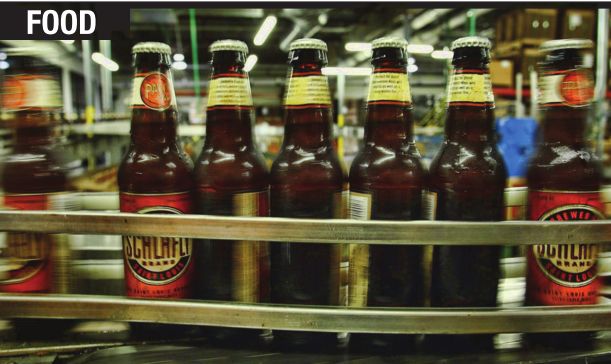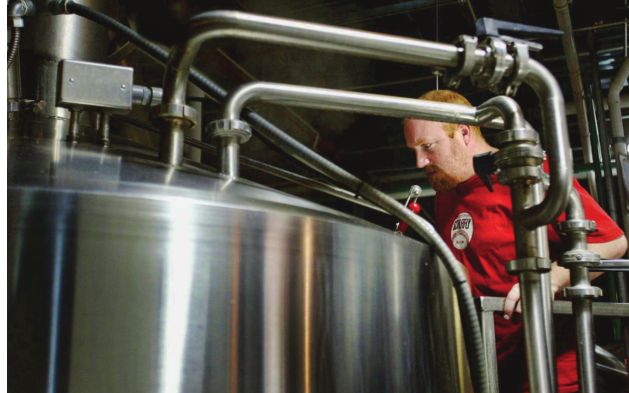
For as long as I can remember, St. Louis has been a beer town. And for most of that time, St. Louis was a one-brewery town. Anheuser- Busch ruled the roost; even sighting a Miller High Life – the champagne of bottled beer – was a rare event. Of course Anheuser- Busch, which has been in business since the mid-1800s, was local. Before the Arch, it almost seemed as if the company’s beautiful Clydesdales horses pulling the old-fashioned wagon with drivers in turn-of-the-century outfits and the Dalmatian dog sitting proudly beside them were the very symbol of St. Louis.
One of the effects of Prohibition was the elimination of almost all small breweries. Even small towns usually had breweries – Springfield had at least two – and big cities had dozens. Some larger breweries, including Anheuser- Busch, were able to ride out Prohibition by selling such items as brewer’s yeast, malt extract and ice cream. Anheuser-Busch also made Bevo, a nonalcoholic malt drink.
When Prohibition ended, those larger breweries quickly went back to making beer. But most of the smaller breweries weren’t so lucky, falling victim to production, marketing and distribution strategies of the big guys. By 1983, there were only 80 American breweries owned by only 51 companies.
The beginning of a renaissance in American craft brewing began – where else? – in California in 1965 with the opening of San Francisco’s Anchor Brewing Company. It took awhile for craft brewing to take hold, but by the end of the 20th century, more breweries were operating in the United States than in any other country on earth. Today the number exceeds 3,000.
St. Louis’ foray into the business of craft microbreweries was slower than most cities and regions of its size, undoubtedly because of the dominance of Anheuser-Busch. But these days, St. Louis and its surrounding towns and suburbs (including some in Illinois) boast dozens of breweries and brewpubs. On Nov. 20, Slow Food Springfield is sponsoring a St. Louis Microbrewery Tour, visiting four of St. Louis’ best and most highly regarded microbreweries, including one that is also a micro-distillery.
The tour begins by attending Beer School at the Schlafly Brewing Bottleworks. The tour includes information about the brewing process, what goes into the recipes for different brews, as well as their times from brewing to bottling. A part of the Beer School is tasting and comparing some of Schlafly’s best beers. After such a serious scholastic endeavor, lunch is next at Schlafly’s excellent (my personal opinion) restaurant.
As the first craft brewery in St. Louis since the end of Prohibition, Schlafly Bottleworks has been described as St. Louis’ “local home of beer.” The brewery began life in 1989 as the St. Louis Brewery. While that remains its official business name, its beers sport the Schlafly label and its facilities as Schlafly Bottleworks. The 2008 merger of Anheuser-Busch and international brewing giant InBev made the St. Louis Brewery the largest locally owned brewery in Missouri. The merger created what is now known as Anheuser-Busch InBev, the largest brewing conglomerate in the world, headquartered in Belgium.
I’ve often wondered if there was a connection between Schlafly Bottleworks and the ultra-conservative activist Phyllis Schlafly. Turns out that Tom Schlafly, one of the brewery’s owners and after whom their beers are labeled, is the nephew of Phyllis’ husband. She has no connection with the brewery; in fact, quite the opposite. When Tom and his partners attempted to trademark the Schlafly name (for beer) in 2014, she filed a complaint, saying “Alcohol has a connotation that is the opposite of conservative values.” Attempts at resolution have apparently failed so far; the matter appears headed for court.
The
next stop on Slow Food Springfield’s St. Louis brewery tour is
Perennial Artisan Ales, where the group will join a release party.
Established in 2011, Perennial’s philosophy is to brew beer with the
adventurous craft beer drinker in mind. They focus on hand-crafted,
small batches of beer, using local, seasonal and organic ingredients as
much as possible. Their beers are influenced primarily by Belgian and
American craft styles, although adding ingredients such as fruits,
spices or wild yeast strains can cause the beers to defy traditional
categories. Different barrel-aging protocols include beers aged in wine
and spirits barrels, ranging from a Rye barrel-aged Mexican Chocolate
Stout to a wild yeast-fermented Saison aged on Missouri wine grapes in
French oak wine barrels.
The
release party will celebrate the most recent batch of Abraxas, an
imperial stout that’s one of their most popular. Stouts are a class of
dark beers often but not always with a relatively high alcohol content
that originated in the British Isles. The first imperial stout, also
known as Russian imperial stout, was first brewed in the 18th century by
Thrale’s Brewery in London, England, to be exported to the Russian
court of Empress Catherine II. She was Russia’s longest-ruling female.
She was a forceful and effective ruler, as well as quite a hell-raiser
in her personal life; certainly not too much a lady to enjoy her special
brew.
The tour’s next
stop will be Four Hands Brewing Company, which offers four beers
throughout the year as well as seasonal creations. One of their dark
beers is a milk stout, a style of stout brewed with lactose that is
fermented over cocoa nibs, providing notes of chocolate. Four Hands’
20,000-square foot brewing facility includes 3,000 feet devoted to
barrel aging, using wine and whiskey casks.
The
final stop on the tour is Square One Brewery and Distillery, located in
a “lovingly” restored building that is on the National Registry of
Historic Places. Square One, which also features a restaurant, is
located on Lafayette Square, one of St. Louis’ most gorgeous spots. The
square and the buildings and homes surrounding it and on nearby streets
are worth a tour of their own.
Four
Hands was begun in 2006 as a microbrewery and restaurant. In 2008, they
added a micro-distillery to the roster to become Missouri’s first
distillery/restaurant, and one of very few in America. Their mission is
to “combine the expertise of master distiller, master brewer and chef to
create an amazing array of flavors and tastes for our customers.”
Springfield Slow Food’s Square One stop will provide an opportunity to
experience the complex breadth and depth of craft distilling and
brewing. And, not least, a chance to couple that experience with food,
with an appetizer buffet prepared by Square One’s chef.
Slow
Food Springfield’s Microbrewery Tour will be Saturday, Nov. 7. It will
depart from the Walmart Supercenter, 1100 Lejune Dr., in Springfield at 9
a.m., and return at approximately 9 p.m. The cost is $75 dollars and
includes touring coach transportation, Beer School, tapping party,
brewery tours and the appetizer buffet at Square One. Lunch at Schlafly
Bottleworks is not included.
Space is limited to 50 people. Reservations can be made at http://slowfoodspringfield.org.
Slow
Food Springfield’s next event will be its 5th Annual Heritage Pork
Dinner at Maldaner’s Restaurant on Friday, Nov. 20. This yearly feast
celebrates all things porky, with a different “Nose to Tail” menu
created each November by Chef Michael Higgins. The cost for the
four-course menu is $47.12 (including ticketing fee), and a cash bar
will be available.
The
pig for this year’s dinner will be provided by Papa’s Pasture. Owner
Blaine Bilyeu will speak after the dinner about the history of Papa’s
Pasture and describe a typical day at the farm. She will also discuss
various breeds and why heritage breeds (this year’s pig is a Berkshire)
differ from those in almost all Confined Animal Feeding Operations
(CAFOs), why they taste so much better and their importance in
sustainable agriculture. Reservations can be made at http://
slowfoodspringfield.org.
Contact Julianne Glatz at [email protected].
